Bislang sind in der universitären historischen Ausbildung kaum Lehrbücher eingesetzt worden, was ein Wissenschaftsverständnis reflektiert, das Geschichte nicht als etwas Definitives betrachtet. Vielmehr geht man davon aus, daß „jede Generation ihre eigene Geschichte schreiben“ müsse, um ein häufig vorgebrachtes Argument zu verwenden. Ein Proseminar hat daher das Ziel, die Fähigkeit zu vermitteln, Geschichte eigenständig in wissenschaftlicher Form aus den Quellen zu rekonstruieren.
Wenn an dieser Stelle dennoch eine Auswahl an Lehr- und Handbüchern aufgeführt ist, soll dieses Angebot ausschließlich als eine erste Orientierungshilfe für Studenten verstanden werden, die mit den entsprechenden Werken noch unvertraut sind.
Enzyklopädie deutscher Geschichte (EdG)
Pohl, Walter: Die Germanen (Enzyklopädie deutscher Geschichte, 57), 2. Aufl., München 2004.
Kaiser, Reinhold: Das römische Erbe und das Merowingerreich (Enzyklopädie deutscher Geschichte, 26), 3. Aufl., München 2004.
Ehlers, Joachim: Die Entstehung des Deutschen Reiches (Enzyklopädie deutscher Geschichte, 31), 2. Aufl., München 1998.
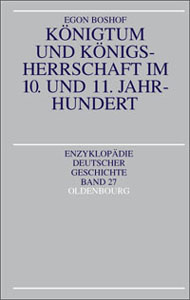
Boshof, Egon: Königtum und Königsherrschaft im 10. und 11. Jahrhundert (Enzyklopädie deutscher Geschichte, 27), 2. Aufl., München 1997.
Hartmann, Wilfried: Der Investiturstreit (Enzyklopädie deutscher Geschichte, 21), 2. Aufl., München 1996.
Schimmelpfennig, Bernhard: Könige und Fürsten, Kaiser und Papst nach dem Wormser Konkordat (Enzyklopädie deutscher Geschichte, 37), München 1996.
Krieger, Karl-Friedrich: König, Reich und Reichsreform im Spätmittelalter (Enzyklopädie deutscher Geschichte, 14), München 1992.
Schubert, Ernst: Fürstliche Herrschaft und Territorium im späten Mittelalter (Enzyklopädie deutscher Geschichte, 35), München 1996.
Angenendt, Arnold: Grundformen der Frömmigkeit im Mittelalter (Enzyklopädie deutscher Geschichte, 68), 2. Aufl., München 2004.
Berg, Dieter: Deutschland und seine Nachbarn 1200-1500 (Enzyklopädie deutscher Geschichte, 40), München 1997.
Borgolte, Michael: Die mittelalterliche Kirche (Enzyklopädie deutscher Geschichte, 17), 2. Aufl., München 2004.
Hammerstein, Notker: Bildung und Wissenschaft vom 15. bis zum 17. Jahrhundert (Enzyklopädie deutscher Geschichte, 64), München 2003.
Hechberger, Werner: Adel, Ministerialität und Rittertum im Mittelalter (Enzyklopädie deutscher Geschichte, 72), München 2004.
Paravicini, Werner: Die ritterlich-höfische Kultur des Mittelalters (Enzyklopädie deutscher Geschichte, 32), München 1994.
Rösener, Werner: Agrarwirtschaft, Agrarverfassung und ländliche Gesellschaft im Mittelalter (Enzyklopädie deutscher Geschichte, 13), München 1992.
Toch, Michael: Die Juden im mittelalterlichen Reich (Enzyklopädie deutscher Geschichte, 44), 2. Aufl., München 2003.
Gebhardt. Handbuch der deutschen Geschichte
Haverkamp, Alfred: Perspektiven deutscher Geschichte während des Mittelalters (Gebhardt. Handbuch der deutschen Geschichte, 1), 10. Aufl., Stuttgart 2004, S. 1-143.
Prinz, Friedrich: Europäische Grundlagen deutscher Geschichte (4.-8. Jahrhundert) (Gebhardt. Handbuch der deutschen Geschichte, 1), 10. Aufl., Stuttgart 2004, S. 145-647.
Schieffer, Rudolf: Die Zeit des karolingischen Großreichs (714-887) (Gebhardt. Handbuch der deutschen Geschichte, 2), 10. Aufl., Stuttgart 2005.
Haverkamp, Alfred: Zwölftes Jahrhundert 1125-1198 (Gebhardt. Handbuch der deutschen Geschichte, 5), 10. Aufl., Stuttgart 2003.
Stürner, Wolfgang: Dreizehntes Jahrhundert 1198-1273 (Gebhardt. Handbuch der deutschen Geschichte, 6), 10. Aufl., Stuttgart 2007.
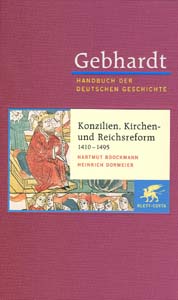
Boockmann, Hartmut und Dormeier, Heinrich: Konzilien, Kirchen- und Reichsreform (1410-1495) (Gebhardt. Handbuch der deutschen Geschichte, 8), 10. Aufl., Stuttgart 2005.
Reinhard, Wolfgang: Probleme deutscher Geschichte 1495-1806. Reichsreform und Reformation 1495-1555 (Gebhardt. Handbuch der deutschen Geschichte, 9), 10. Aufl., Stuttgart 2001.
Neue deutsche Geschichte
Prinz, Friedrich: Grundlagen und Anfänge. Deutschland bis 1056 (Neue Deutsche Geschichte, 1), 2. Aufl., München 1993.
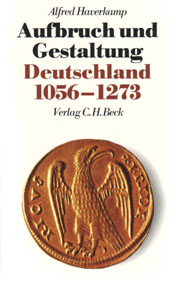
Haverkamp, Alfred: Aufbruch und Gestaltung. Deutschland 1056-1273 (Neue Deutsche Geschichte, 2), 2. Aufl., München 1993.
Oldenbourg Grundriß der Geschichte
Martin, Jochen: Spätantike und Völkerwanderung (Oldenbourg Grundriss der Geschichte, 4), 4. Aufl., München 2001.
Schneider, Reinhard: Das Frankenreich (Oldenbourg Grundriss der Geschichte, 5), 4. Aufl., München 2001.
Fried, Johannes: Die Formierung Europas 840-1046 (Oldenbourg Grundriss der Geschichte, 6), 3. Aufl., München 2008
Jakobs, Hermann: Kirchenreform und Hochmittelalter 1046-1215 (Oldenbourg Grundriss der Geschichte, 7), 4. Aufl., München 1999.
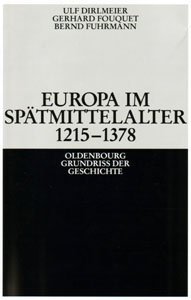
Dirlmeier, Ulf u.a.: Europa im Spätmittelalter 1215-1378 (Oldenbourg Grundriß der Geschichte, 8), München 2003.
Meuthen, Erich: Das 15. Jahrhundert (Oldenbourg Grundriß der Geschichte, 9), 4. Aufl., München 2006.
Propyläen Geschichte Deutschlands
Fried, Johannes: Der Weg in die Geschichte. Die Ursprünge Deutschlands bis 1024 (Propyläen Geschichte Deutschlands, 1), Berlin 1994.
Keller, Hagen: Zwischen regionaler Begrenzung und universalem Horizont. Deutschland im Imperium der Salier und Staufer 1024 bis 1250 (Propyläen Geschichte Deutschlands, 2), Berlin 1986.
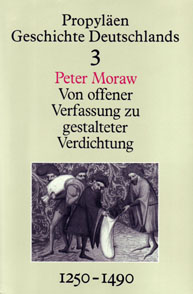
Moraw, Peter: Von offener Verfassung zu gestalteter Verdichtung. Das Reich im späten Mittelalter 1250 bis 1490 (Propyläen Geschichte Deutschlands, 3), Berlin 1985.
Lutz, Heinrich: Das Ringen um deutsche Einheit und kirchliche Erneuerung. Von Maximilian I. bis zum Westfälischen Frieden 1490 bis 1648 (Propyläen Geschichte Deutschlands, 4), Berlin 1983.
Siedler deutsche Geschichte
Wolfram, Herwig: Das Reich und die Germanen. Zwischen Antike und Mittelalter (Das Reich und die Deutschen, 1), Berlin 1990.
Schulze, Hans K.: Vom Reich der Franken zum Land der Deutschen. Merowinger und Karolinger (Das Reich und die Deutschen, 2), Berlin 1987.
Schulze, Hans K.: Hegemoniales Kaisertum. Ottonen und Salier (Das Reich und die Deutschen, 3), Berlin 1991.

Boockmann, Hartmut: Stauferzeit und spätes Mittelalter. Deutschland 1125-1517 (Das Reich und die Deutschen, 4), Berlin 1987.
Urban Taschenbücher
In der Reihe der Urban Taschenbücher erscheinen Monographien zu den einzelnen Herrscherdynastien des Mittelalters, womit eine weitere sinnvolle Darstellungsgliederung der mittelalterlichen Geschichte vorliegt.
Ewig, Eugen: Die Merowinger und das Frankenreich (Urban Taschenbücher, 392), 5. Aufl., Stuttgart 2006.
Schieffer, Rudolf: Die Karolinger (Urban Taschenbücher, 411), 4. Aufl., Stuttgart 2006.
Althoff, Gerd: Die Ottonen. Königsherrschaft ohne Staat (Urban Taschenbücher, 473), 2. Aufl., Stuttgart 2005.
Beumann, Helmut: Die Ottonen (Urban Taschenbücher, 384), 5. Aufl., Stuttgart 2000.
Engels, Odilo: Die Staufer (Urban Taschenbücher, 154), 8. Aufl., Stuttgart 2005.
Schneidmüller, Bernd: Die Welfen. Herrschaft und Erinnerung (819-1252) (Urban Taschenbücher, 465), Stuttgart 2000.
Boshof, Egon: Die Salier (Urban Taschenbücher, 387), 4. Aufl., Stuttgart 2000.
Krieger, Karl-Friedrich: Die Habsburger im Mittelalter. Von Rudolf I. bis Friedrich III. (Urban Taschenbücher, 452), 2. Aufl., Stuttgart 2004.
Erbe, Michael: Die Habsburger 1493-1918. Eine Dynastie im Reich und in Europa (Urban Taschenbücher, 454), Stuttgart 2000.
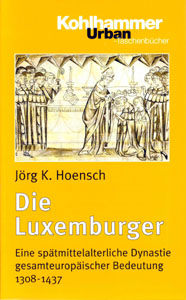
Hoensch, Jörg K.: Die Luxemburger. Eine spätmittelalterliche Dynastie gesamteuropäischer Bedeutung 1308-1437 (Urban Taschenbücher, 407), Stuttgart 2000.
Holzfurtner, Ludwig: Die Wittelsbacher. Staat und Dynastie in acht Jahrhunderten (Urban Taschenbücher, 592), Stuttgart 2005.
Ehlers, Joachim: Die Kapetinger (Urban Taschenbücher, 471), Stuttgart 2000.
Berg, Dieter: Die Anjou-Plantagenet. Die englischen Könige im Europa des Mittelalters (1100-1400) (Urban Taschenbücher, 577), Stuttgart 2003.
The New Cambridge Medieval History
Die New Cambridge Medieval History ist ebenfalls online verfügbar.
Band 1
Fouracre, Paul (Hrsg.): The New Cambridge Medieval History, Band 1: c.500–c.700, Cambridge u.a. 2005.
Enthält: Fouracre, Paul: Introduction. The History of Europe 500-700; Gerberding, Richard: The later Roman Empire; Halsall, Guy: The barbarian invasions; Halsall, Guy: The sources and their interpretation; Louth, Andrew: The eastern empire in the sixth century; Moorhead, John: The Byzantines in the West in the sixth century; Moorhead, John: Ostrogothic Italy and the Lombard invasions; Barbero, A. und Loring, M.I.: The formation of the Sueve and Visigothic kingdoms in Spain; Van Dam, Raymond: Merovingian Gaul and the Frankish Conquests; Davies, Wendy: The Celtic kingdoms; Hamerow, Helena: The earliest Anglo-Saxon kingdoms; Louth, Andrew: The Byzantine empire in the seventh century; Hillenbrand, Carole: Muhammad and the rise of Islam; Barbero, A. und Loring, M.I.: The Catholic Visigothic Kingdom; Fouracre, Paul: Francia in the seventh century; Stancliffe, Clare: Religion and society in Ireland; Stancliffe, Clare: Christianity amongst the Britons, Dálriadan Irish and Picts; Thacker, Alan: England in the seventh century; Hedeager, Lotte: Scandinavia (c.500-700 AD; Kobylinski, Zbigniew: The Slavs 500-700 AD; Toch, Michael: The Jews in Europe, 500-1050; Wormald, Patrick: Kings and kingship; Loseby, Simon: The Mediterranean economy; Lebecq, Stéphane: The Northern seas (fifth to eighth centuries); Blackburn, Mark: Money and coinage; Scheibelreiter, Georg: Church structure and organisation; Wood, Ian: Christianisation and the dissemination of Christian teaching; Fontaine, Jacques: Education and learning (500-700); Wood, Ian: Art and architecture of western Europe, 500-700; Brubaker, Leslie: Art and architecture, 500-700: the East

Band 2
McKitterick, Rosamond (Hrsg.): The New Cambridge Medieval History, Band 2: c.700–c.900, Cambridge u.a. 1995.
Enthält: McKitterick, Rosamond: Introduction. Sources and interpretation; Keynes, Simon: England, 700-900; Ó Corráin, Donnchadh: Ireland, Scotland and Wales, c.700 to the early eleventh century; McKitterick, Rosamond: England and the Continent; Fouracre, Paul: Frankish Gaul to 814; Nelson, Janet L.: The Frankish kingdoms, 814-898. The West; Fried, Johannes: The Frankish kingdoms, 817-911. The East and Middle kingdoms; Smith, Julia M.H.: Fines imperii. The marches; Coupland, Simon: The Vikings in Francia and Anglo-Saxon England to 911; Lund, Niels: Scandinavia, c.700-1066; Shepard, Jonathan: Slavs and Bulgars; Kennedy, Hugh: The Muslims in Europe; Collins, Roger: Spain. The northern kingdoms and the Basques, 711-910; Delogu, Paolo: Lombard and Carolingian Italy; Brown, T.S.: Byzantine Italy, c.680-876; McCormick, Michael: Byzantium and the west, 700-900; Nelson, Janet L.: Kingship and royal government; Airlie, Stuart: The aristocracy; Goetz, Hans-Werner: Social and military institutions; Verhulst, Adriaan: Economic organisation; Wickham, Chris: Rural society in Carolingian Europe; Blackburn, Mark: Money and coinage; Noble, Thomas F.X.: The papacy in the eighth and ninth centuries; Reynolds, Roger E.: The organisation, law and liturgy of the western church, 700-900; de Jong, Mayke: Carolingian monasticism. The power of prayer; Smith, Julia M.H.: Religion and lay society; McKitterick, Rosamond: Eighth-century foundations; Banniard, Michel: Language and communication in Carolingian Europe; Contreni, John J.: The Carolingian renaissance. Education and literary culture; Ganz, David: Theology and the organisation of thought; Ganz, David: Book production in the Carolingian empire and the spread of Caroline minuscule; Nees, Lawrence: Art and Architecture; McKitterick, Rosamond: Conclusion.
Band 3
Reuter, Timothy (Hrsg.): The New Cambridge Medieval History, Band 3: c.900-c.1024, Cambridge u.a. 1999.
Enthält: Reuter, Timothy: Introduction; Fossier, Robert: Rural economy and country life; Johanek, Peter: Merchants, markets and towns; Nelson, Janet: Rulers and government; McKitterick, Rosamond: The Church; Wollasch, Joachim: Monasticism; Leonardi, Claudio: Intellectual life; Mayr-Hartin, Henry: Artists and patrons; Müller-Mertens, Eckhard: The Ottonians as kings and queens; Althoff, Gerd: Saxony and the Elbe slavs in the tenth century; Wolfram, Herwig: Bavaria in the tenth and early eleventh centuries; Parisse, Michel: Lotharingia; Bouchard, Constance: Burgundy and Provence, 879-1032; Sergi, Giuseppe: The kingdom of Italy; Dunbabin, Jean: West Francia. The kingdom; Bates, David: West Francia. The northern principalities; Zimmermann, Michel: West Francia. The southern principalities; Keynes, Simon: England; Noonan, Thomas: European Russia, c.500-c.1050; Strzelczyk, Jerzy: Bohemia and Poland; Bakay, Kornél: Hungary; Shepard, Jonathan: Byzantium in equlilibrium, 886-944; Shepard, Jonathan: Bulgaria. The other Balkan ‘empire’; Shepard, Jonathan: Byzantium and the west; Loud, Graham: Southern Italy in the tenth century; Kennedy, Hugh: Sicily and al-Andalus under Muslim rule; Collins, Roger: The Spanish kingdoms.
Band 4, Teil 1
Luscombe, David und Riley-Smith, Jonathan (Hrsg.): The New Cambridge Medieval History, Band 4: c.1024-c.1198, Teil 1, Cambridge u.a. 2004.
Enthält: Luscombe, David und Riley-Smith, Jonathan: Introduction; The rural economy and demographic growth Robert Fossier; Keene, Derek: Towns and the growth of trade; Reynolds, Susan: Government and community, 1024-1204; Landau, Peter: The development of law; Flori, Jean: Knightly society; Hehl, Ernst-Dieter: War, peace and the Christian order, 1024-1204; Cowdrey, H.E.J.: The structure of the church, 1024-1073; Robinson, I.S.: Reform and the church, 1073-1122; Constable, Giles: Religious communities, 1024-1215; Robinson, I.S.: The institutions of the church, 1073-1216; Luscombe, D.E.: Thought and learning; Hamilton, Bernard: Religion and laity (including popular devotions and heresy); Riley-Smith, Jonathan: The crusades, 1095-1198; Richard, Jean: The eastern churches; Kennedy, Hugh: Muslim Spain and Portugal. Al-Andalus and its neighbours, 1025-1198; Chazan, Robert: The Jews in Europe and the Mediterranean basin in the eleventh and twelfth centuries; Ziolkowski, Jan: Literature (Latin and vernacular); Kidson, Patrick: Romanesque and gothic. Architecture and the arts.
Band 4, Teil 2
Luscombe, David und Riley-Smith, Jonathan (Hrsg.): The New Cambridge Medieval History, Band 4: c.1024-c.1198, Teil 2, Cambridge u.a. 2004.
Enthält: Riley-Smith, Jonathan und Luscombe David: Introduction; Blumenthal, Uta-Renate: The papacy, 1024-1122; Vollrath, Hanna: The western empire (including the French speaking imperial lands) under the Salians; Tabacco, Giovanni: Italy in the eleventh century. Northern and central Italy; Loud, Graham: Italy in the eleventh century. Southern Italy Graham Loud; Bouchard, Constance: The kingdom of the Franks to 1108; Barton, Simon: Spain in the eleventh century; Chibnall, Marjorie: England and Normandy, 1042-1137; Angold, Michael: The Byzantine empire, 1025-1118; Dimnik, Martin: Russia, the Bulgars and the southern Slavs, 1024-c. 1200; Wyrozumski, Jerzy: Poland in the eleventh and twelfth centuries; Sawyer, Peter: Scandinavia in the eleventh and twelfth centuries; Berend, Nora: Hungary in the eleventh and twelfth centuries; Robinson, I.S.: The papacy, 1122-1198; Arnold, Benjamin: The western empire, 1125-1197; Tabacco, Giovanni: Italy in the twelfth century. Northern and central Italy; Loud, Graham: Italy in the twelfth century. Norman Sicily; Linehan, Peter: Spain in the twelfth century; Baldwin, John W.: The kingdom of the Franks from Louis VI to Philip II. Crown and government; Bur, Michel: The kingdom of the Franks from Louis VI to Philip II. The seigneuries Michel Bur; Keefe, Thomas K.: England and the Angevin dominions, 1137-1204; Barrow, Geoffrey: Scotland, Wales and Ireland in the twelfth century; Magdalino, Paul: The Byzantine empire, 1118-1204; Mayer, Hans: The Latin east, 1098-1204; Brett, Michael: Abbasids, Fatimids and Seljuqs; Humphreys, Stephen: Zangids, Ayyubids and Seljuqs.
Band 5
Abulafia, David (Hrsg.): The New Cambridge Medieval History, Band 5: c.1198-c.1300, Cambridge u.a. 1999.
Enthält: Abulafia, David: Introduction; Stacey, Robert: Social change in the thirteenth century. Nobles and knights; Epstein, Steven: Social change in the thirteenth century. Urban society; Sivéry, Gérard Social change in the thirteenth century. Rural society; Reyerson, Kathryn: Commerce and communications; Smith, Colin: The vernacular; Binski, Paul: Thirteenth-century art and architecture; Watt, J.A.: The papacy in the thirteenth century; Hamilton, Bernard: The Albigensian Crusades and heresy; Vauchez, André: The Church and the laity; Verger, Jacques: The universities and scholasticism; Jordan, William Chester: The Capetians from Philip II to Philip IV; Carpenter, David: The Plantagenet kings; Cox, Eugene: The kingdom of Burgundy, the lands of Savoy and adjacent territories; Toch, Michael: Welfs, Hohenstaufen and Habsburgs in Germany, 1197-1308; Blockmans, Wim: Flanders in the thirteenth century; Pryor, John: Northern Italy. The maritime republics; Tangheroni, Marco: Sardinia and Corsica from the mid-twelfth to the early fourteenth century; Trevor, Dean: The rise of the signori; Green, Louis: Florence; Abulafia, David: The kingdom of Sicily under Hohenstaufen and Angevin rule; Jacoby, David: Byzantium after the Fourth Crusade. The Latin empire of Constantinople and the Frankish states in Greece; Angold, Michael: Byzantium after the Fourth Crusade. The Greek rump states and the recovery of Byzantium Michael Angold; Housley, Norman: The thirteenth-century crusades in the Mediterranean; Edbury, Peter: The Crusader states and Cyprus; Irwin, Robert: The rise of the Mamluks; (b) Brett, Michael: The Maghrib; Abulafia, David: The Nasrid kingdom of Granada; Abulafia, David: The rise of Aragon-Catalonia; Linehan, Peter: Castile, Portugal and Navarre; Jackson, Peter: The Mongols and Europe; Bagge, Sverre: The Scandinavian kingdoms; Burleigh, Michael: The military orders in the Baltic; Rowell, S.C.: The central European kingdoms; Ducellier, Alain: Albania, Serbia and Bulgaria; Franklin, Simon: Russia; Bartlett, Robert: The Celtic lands.
Band 6
Jones, Michael (Hrsg.): The New Cambridge Medieval History, Band 6: c.1300-c.1415, Cambridge u.a. 2000.
Enthält: Jones, Michael: Introduction; Rigaudière, Albert: The theory and practice of government in western Europe; Catto, Jeremy: Currents of religious thought and expression; Verger, Jacques: The universities; Freedman, Paul: Rural society; Leguay, Jean-Pierre: Urban life; Klapisch-Zuber, Christiane: Plague and family life; Spufford, Peter: Trade in fourteenth-century Europe; Keen, Maurice: Chivalry and the aristocracy; Binski, Paul: Court patronage and international gothic; Crossley, Paul: Architecture; Havely, Nick: Literature in Italian, French and English. Uses and muses of the vernacular; Ormrod, Mark: England. Edward II and Edward III; Barron, Caroline M.: England. The reign of Richard II; Carr, A.D.: Wales; Grant, Alexander: Fourteenth-century Scotland; Frame, Robin: Ireland; Jones, Michael: France. The last Capetians and the early Valois kings, 1314-1364; Autrand, Françoise: France under Charles V and Charles VI; Law, John: Italy in the age of Dante and Petrarch. The north; Green, Louis: Italy in the age of Dante and Petrarch. Florence and the republican tradition; Abulafia, David: Italy in the age of Dante and Petrarch. The Italian south; Herde, Peter: The Empire. From Adolph I to Lewis of Bavaria, 1292-1347; Hlavacek, Ivan: The Empire. The Luxemburgs and Rupert of the Palatinate, 1347-1410; Prevenier, Walter: The Low Countries, 1290-1415; Forey, Alan: The Iberian Peninsula. The crown of Aragon; Linehan, Peter: The Iberian Peninsula. Castile, Navarre and Portugal; Zutshi, Patrick: The Avignon papacy; Kaminsky, Howard: The Great Schism; Rowell, S.C.: Baltic Europe; Michaud, Claude: The kingdoms of central Europe in the fourteenth century; Kollmann, Nancy Shields: The principalities of Rus’ in the fourteenth century; Laiou, Angeliki E.: The Byzantine empire in the fourteenth century; Balard, Michel: Latins in the Aegean and the Balkans in the fourteenth century; Kunt, I. Metin: The rise of the Ottomans; Edbury, Peter: Christians and Muslims in the eastern Mediterranean.
Band 7
Allmand, Christopher (Hrsg.): The New Cambridge Medieval History, Band 7: c.1415-c.1500, Cambridge u.a. 1998.
Enthält: Genet, Jean-Philippe: Politics. Theory and practice; Blockmans, Wim: Representation (since the thirteenth century); Black, Antony: Popes and councils; Contamine, Philippe: The European nobility; Dyer, Christoper: Rural Europe; Dobson, Barrie: Urban Europe; Childs, Wendy: Commerce and trade; Allmand, Christopher: War; Fernàndez-Armesto, Felipe: Exploration and discovery; Rapp, Francis: Religious belief and practice; Verger, Jacques: Schools and universities; Black, Robert: Humanism; Vale, Malcolm: Manuscripts and books; McKitterick, David: The beginning of printing; Crossley, Paul: Architecture and painting; 16. Curtis, Gareth: Music; Scott, Tom: Germany and the Empire; Klassen, John: Hus, the Hussites and Bohemia; Vale, Malcolm: France at the end of the Hundred Years War (c. 1420-1461); Chevalier, Bernard: The recovery of France, 1450-1520; Schnerb, Bertrand: Burgundy; Powell, Edward: Lancastrian England; Horrox, Rosemary: Yorkist and early Tudor England; Cosgrove, Art: Ireland; Wormald, Jenny: Scotland: 1406-1513; Mallett, Michael: The northern Italian states; Ryder, Alan: The papal states and the kingdom of Naples; Mario Del Treppo: Aragon; MacKay, Angus: Castile and Navarre; de Sousa, Armindo: Portugal; Sablonier, Roger: The Swiss Confederation; Riis, Thomas: The states of Scandinavia c.1390-c.1536; Bak, Janos: Hungary. Crown and estates; Gieysztor, Aleksander: The kingdom of Poland and the grand duchy of Lithuania, 1370-1506; Shields Kollmann, Nancy: Russia; Bryer, Anthony: Byzantium. The Roman Orthodox world, 1393-1492; Luttrell, Anthony: The Latin east; Zachariadou, Elizabeth: The Ottoman world; Allmand, Christopher: Conclusion.